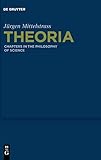Theoria : Chapters in the Philosophy of Science / Jürgen Mittelstrass.
Material type: TextPublisher: Berlin ; Boston : De Gruyter, [2018]Copyright date: ©2018Description: 1 online resource (XII, 198 p.)Content type:
TextPublisher: Berlin ; Boston : De Gruyter, [2018]Copyright date: ©2018Description: 1 online resource (XII, 198 p.)Content type: - 9783110595932
- 9783110592825
- 9783110596687
- 501 23
- Q175 .M67185 2018
- Q175 .M58 2018
- online - DeGruyter
- Issued also in print.
| Item type | Current library | Call number | URL | Status | Notes | Barcode | |
|---|---|---|---|---|---|---|---|
 eBook
eBook
|
Biblioteca "Angelicum" Pont. Univ. S.Tommaso d'Aquino Nuvola online | online - DeGruyter (Browse shelf(Opens below)) | Online access | Not for loan (Accesso limitato) | Accesso per gli utenti autorizzati / Access for authorized users | (dgr)9783110596687 |
Frontmatter -- Contents -- Preface -- I. Concepts -- 1. Complexity, Reductionism, and Holism -- 2. Predictability, Determinism, and Emergence -- 3. Discovery -- 4. Time -- 5. Limits of Science? -- 6. Transdisciplinarity -- 7. Pragmatic Dualism in the Philosophy of Mind -- II. Nature and History of Science -- 8. From Plato’s World to Einstein’s World -- 9. Causality in Greek Thought -- 10. Scientific Truth, Copernicus, and the Case of an Unwelcome Preface -- 11. Newton’s Concept of Hypothesis and the Origin of Empiricism in Physics -- 12. Philosophical Foundations of Science in the 20th Century -- 13. The Scientific Mind. Does Science Make Its Own History? -- III. Ethical and Institutional Matters -- 14. The Moral Substance of Science -- 15. Science and Culture -- 16. Naturalness and Directing Human Evolution -- 17. Through a Glass Darkly. On the Enigmatic Nature of Science -- 18. Quality Assessment in Higher Education Institutions – from the Perspective of Those Assessed -- 19. The Joy and Woe of Scientific Policy Advice -- 20. Science – the Last Adventure -- Acknowledgements -- Index of Names -- Index of Subjects
restricted access online access with authorization star
http://purl.org/coar/access_right/c_16ec
Science is knowledge gained and justified methodically. It is achieved by research and theory formation. But what is a methodical procedure and what are methodically established justifications? What kind of principles must be observed in order to obtain the degree of objectivity that is generally claimed by science? What is the relation between science in the research mode and science in presentation mode, i.e., in its theoretical form? Do the same principles hold here? And how are they justified? Is it even possible to speak of justification in a theoretical sense? Or do we have to be content with less – with corroboration and confirmation? Is the distinction between the context of discovery and the context of justification the last word in methodical and theoretical matters? And how does this distinction relate to that between research and presentation – the constitution of (scientific) objects on the one hand and (theoretical) propositions about them on the other? The analyses and constructions in this book take up these questions. They are explicitly intended as philosophical contributions, not only in the sense implied by the disciplinary use of the term philosophy of science, but also in the sense of a reflection on science that, alongside more technical aspects of methodologies and elements of theories, also has an eye for anthropological and cultural aspects.
Issued also in print.
Mode of access: Internet via World Wide Web.
In English.
Description based on online resource; title from PDF title page (publisher's Web site, viewed 04. Okt 2022)


